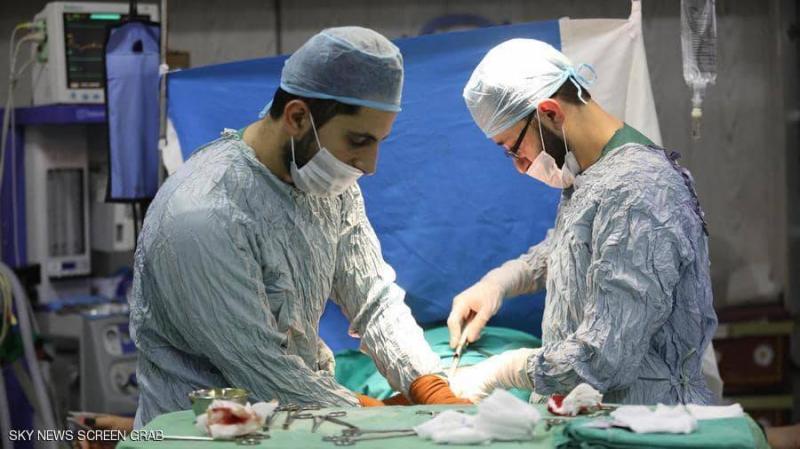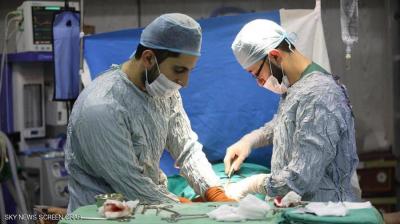Under the title "Doctors are Gradually Migrating from Syria, and Anesthesiologists are a Rare Currency," Sky News reported that the head of anesthesiology at the Syrian Medical Association recently warned of a sharp decline in the number of anesthesiologists in the country due to a significant outflow to abroad. This warning highlights the phenomenon of brain drain from Syria, particularly among doctors of all specialties, as a result of the accumulated crises experienced during years of internal conflict.
Statistics reveal the alarming danger threatening the Syrian medical sector due to the emigration of doctors, including recent graduates. There are only four anesthesiologists under the age of 30 across Syria, while those between 30 and 40 years old number just 65. Approximately 300 anesthesiologists fall in the 40 to 50 age range, reflecting the seriousness of the situation, with the remaining doctors approaching retirement age, according to statements from Zubaida Shamout, head of anesthesiology and pain management at the Syrian Medical Association.
Shamout announced that the country is in a state of danger, with a complete absence of anesthesiologists in entire Syrian governorates such as Raqqa and Idlib, and very few in other areas like Quneitra, which has seen its number drop to five, while Daraa has six, Hasaka has nine, Deir ez-Zor has 11, and Sweida has 15. Even in the capital, Damascus, the number of anesthesiologists does not exceed 150, with only 13 in the countryside around the city.
Experts indicate that these low numbers in a country the size of Syria reflect a critical shortage according to scientific standards, where anesthetic staff are nearly nonexistent—a crucial component of any integrated and sound medical system. Experts expressed surprise at the lack of initiative from responsible Syrian authorities to implement immediate plans and solutions for this serious issue, which threatens the lives of millions of Syrians, as the presence of an anesthesiologist is essential for performing surgeries, even minor ones, and for monitoring patients during and after procedures.
In this context, a Syrian anesthesiologist, who requested anonymity, told Sky News Arabia, "It is unnecessary to point out that Syria has become a repellent environment for competencies; the overall situation in the country is unstable. Although the levels of war and violence have decreased, economic, security, and social conditions remain fragile and turbulent, and the effects of the war will paralyse the country for years, if not decades."
He continued, "Most Syrians aspire to leave and escape the misery of life in the country, and doctors are no exception. A Syrian doctor residing in the Gulf countries or most European nations earns multiples of what he receives in his country. Therefore, it is the right of the Syrian doctor to seek job opportunities abroad and to escape a tragic reality, especially for us anesthesiologists."
The doctor questioned, "Is it reasonable to receive a monthly salary for such a sensitive and precise scientific specialty as mine that does not even reach 100 US dollars? Is there any injustice and squandering of the future more than this? Many doctors have not emigrated yet, including myself, as migration from Syria has become financially burdensome."
Dr. Mohammed Akram Al-Sharaa, founder of the "Samaat Hakim" medical platforms in Syria, noted in a dialogue with Sky News Arabia, "Doctors, like all segments of society, live under oppressive conditions due to the war that has imposed itself upon us and its destructive repercussions, particularly anesthesiologists, whose work nature keeps them under constant physical and psychological pressure. They are always in operating rooms and cannot open private clinics or work in them like other doctors, whose average salaries do not exceed 100,000 Syrian pounds—a sum that is completely incompatible with the exorbitant cost of living in the country, forcing them to work privately in clinics or private hospitals, which does not apply to anesthesiologists.”
He explained that these factors increase the difficulty for anesthesiologists compared to their colleagues in other medical specialties. "Despite the government adding salary increases with monthly bonuses, due to the severe nature of the specialty's difficulties and the harsh and critical working conditions, anesthesiology often falls low on the preferences and choices of medical students wishing to select a specialization."
He added, "According to my information, there is a government plan aimed at enforcing medical students to specialize in anesthesiology, but it has not yet materialized. With this alarming decline in the number of anesthesiologists in Syria, this plan may proceed and enter into effect in an attempt to address this serious phenomenon."
Dr. Al-Sharaa, a cardiologist at Tishreen Military Hospital in Damascus, stated, "The situation of Syrian doctors is very poor; for instance, everything has multiplied a hundred-fold in Syria, except for the doctor's consultation price due to medical ethics that are inconsistent with raising consultation fees. The community depends on medicine as a humanitarian profession, expecting doctors to consider people's circumstances. A consultation before the crisis was 500 pounds when one US dollar equaled 50 Syrian pounds, while it is now about 3,200 pounds. The consultation prices now range from 4,000 to 15,000 pounds, and even if they reach 25,000 pounds, it means nothing in light of the current inflation and complicated living conditions."
He added, "Thus, doctors are exploited by private hospitals, which take advantage of their need for extra work, as the average rate of a doctor's work hour in a private hospital is around 600 Syrian pounds, less than a quarter of a dollar. Suppose you, as a doctor, earn even around 2,000 pounds per hour. In that case, the total daily earnings in this case at the private hospital would reach approximately 30,000, which is less than 10 dollars—an egregious exploitation of the Syrian medical workforce."
The average salary for general doctors in Syria is 74,000 Syrian pounds, roughly equivalent to about 25 US dollars. Meanwhile, specialists do not earn more than 100,000 pounds, which amounts to approximately 30 US dollars a month.




